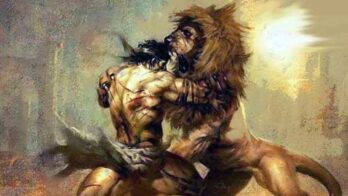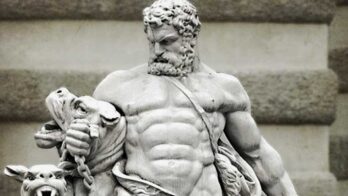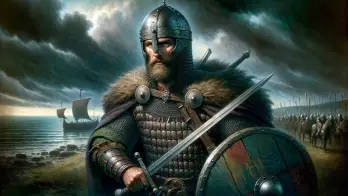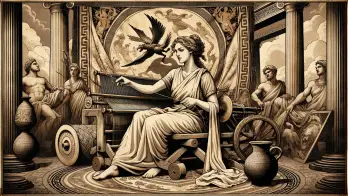According to Greek mythology, Achilles was the son of the mortal hero Peleus and the sea goddess Thetis.
He was raised and trained by the centaur Chiron to become a great warrior. But the fame and glory of Achilles came at a price: he was destined to die young.
After the Trojan prince Paris kidnapped Helen, the queen of Sparta, the Greeks sailed to Troy to bring her back. During the ten-year-long Trojan War, Achilles fought alongside the united armies of Greece.
In the final year of the war, the hero performed one of his most significant acts of valor, killing Hector, the famous commander of the Trojans. But Achilles himself was to die shortly after, brought down at the gates of Troy by Paris and Apollo.
In Greek mythology, Achilles was one of the greatest warriors to have lived on the Greek plains. But he was also a very proud character, coming close to costing the Greeks victory after a quarrel with King Agamemnon.
Their dispute led to the deaths of many Greek warriors, including one of Achilles’ closest friends, Patroclus.
Etymology
The name “Achilles” (or Achilleus) comes from an ancient Greek term found on tablets from the Mycenaean period (ca. 1700-1100 BC).
Originally written in a script called Linear B, which predates the Greek alphabet, the name appears on these tablets in the forms “a-ki-re-u” and “a-ki-re-we.”
The etymological explanations for the name are diverse, but linguists have yet to agree on a single theory.
Some experts believe that the hero’s name comes from the Greek terms “achos” (meaning “pain”) and “laos” (meaning “people”), as most myths and legends about Achilles emphasize the pain that the warrior caused the Trojans.
The similarity of his name to those of river deities such as Acheron and Achelous, combined with his descent from the sea goddess Thetis, suggests that the root “achel” may be associated with water deities.
According to the Greek poet and philosopher Apollodorus, the hero of the Trojan War was initially named Ligyron.
However, in Greek myths and legends, his name was changed to Achilles after his mother, Thetis, abandoned him because the child refused to suckle her breast milk.
In Apollodorus’ version, the hero’s name translates to “without lips” (meaning “he who refused to nurse”), derived from the term “cheilēs” (which means “lips”) and the prefix “a-” (expressing a negation).
Genealogy
Achilles’ mother was Thetis, one of the Nereids. As daughters of the sea god Nereus, the Nereids were themselves goddesses. The hero’s father, Peleus, was the son of Aeacus and the grandson of Zeus.
Peleus was the king of Phthia, a region in northern Greece, while his older brother, Telamon, was the king of the island of Salamis.
Telamon’s son and Achilles’ cousin, Ajax, was also one of the greatest Greek warriors who fought in the Trojan War, actively participating in the siege of Troy.
Parents
- Peleus
- Thetis
Spouses/lovers
- Deidamia
- Briseis
Children
- Neoptolemus
Myths and legends
Achilles was usually described as a young warrior. In Homer’s epics, he was notable for his physical beauty but also for his exceptional armor, crafted, according to legends, by the god Hephaestus.
Furthermore, in Book XVIII of the Iliad, Homer describes Achilles’ shield as an item crafted with such skill and expertise that its magnificence was never surpassed by any other weapon or armor in the entire history of the world.
The birth of Achilles
According to Greek legends, Achilles’ mother, the sea goddess Thetis, was initially courted by the gods Zeus and Poseidon.
According to the most well-known version of the myth, the two gods learned from an oracle that Thetis was destined to give birth to a son who would become a great hero, more beloved by the Greeks than his own father.
However, neither Zeus nor Poseidon wanted a son who could overthrow them, as they had done with their father, the titan Cronos.
According to another version of the myth, the beautiful Thetis rejected the advances of the Olympian lord, as she was loyal to his wife, Hera. Enraged by the girl’s refusal, Zeus took revenge by forcing her to marry an ordinary mortal.
Regardless of the variant of the myth, Thetis eventually married Peleus, the king of Phthia, but only after subjecting him to several trials.
Thus, the brave Peleus had to pursue the goddess across lands and seas while she transformed into various wild animals. Then, Thetis took the form of water and fire and fought with the valiant Peleus.
Ultimately, Peleus emerged victorious, and Thesis agreed to become his wife.
Their wedding was grand, attended by all the gods of Olympus, except Eris, the goddess of discord.
Furious that she was not invited to the wedding, Eris appeared when the festivities were in full swing and threw on the ground a golden apple (the fabled apple of discord) on which she wrote: “For the most beautiful goddess.”
Hera, Athena, and Aphrodite each claimed the golden apple as their own. The quarrel between the three goddesses ultimately contributed to the outbreak of the Trojan War.
After the birth of Achilles, his mother, Thetis, wanted to make him immortal, and there are two central myths about how she tried to achieve this.
In the first, recounted in two important ancient texts – Statius’ Thebaid and Hyginus’ Fabulae – she plunged her son into the River Styx. Achilles’ body became invulnerable, except for the heel held by his mother.
In the second version of the myth, Thetis anointed the newborn’s body with ambrosia and then held him over a fire to harden him. But one night, the goddess’s ritual was interrupted by Peleus, who unexpectedly entered her chamber.
The king was horrified to see how the goddess held his beloved son over the blazing flames, so he rushed in and snatched him from her arms.
It is said that, furious for interrupting her ritual, Thetis abandoned her husband and son, returning to live with the other Nereids in the sea.
Since the ritual was not completed, Achilles’ heel remained the only vulnerable spot on the hero’s body.
King Agamemnon’s call to arms
As with many other great heroes, young Achilles was entrusted to the centaur Chiron to learn the craft of weapons and hunting.
At Chiron’s, Thetis’ son fed only on bone marrow and brains of bear cubs and on fierce lions’ liver. Not long after, Achilles fought like a man, able to hunt and kill the most dangerous beasts in the forests of Pelion.
And when he ran, he could outrun even the swiftest and most agile doe in the mountains.
The Atrides wanted this lad to be by their side in the war when they would attack Troy. So King Agamemnon sent Odysseus himself to find and bring the son of Peleus and the gentle silver-footed Nereid to fight.
Fearing that her son might be killed on the walls of Troy, Thetis dressed him in girl’s clothes and hid him on the island of Skyros among the daughters of King Lycomedes.
But while at the king’s court, Achilles fell in love with one of his daughters, Princess Deidamia. Out of their love, a son named Neoptolemus was born.
It is said that upon learning of Achilles’ hiding place, the hero Odysseus traveled to the island of Skyros.
Then, to lure him out of hiding, Odysseus called on the daughters of Lycomedes, whom he offered various gifts – clothes made of delicate fabrics and gold and silver jewelry.
However, he also slipped in a shield and spear among the gifts.
Later that day, Odysseus asked the soldiers accompanying him to simulate an attack on the palace.
Thinking Deidamia’s life was in danger, the brave Achilles threw off the feminine clothes he wore, took up his shield and spear, and prepared for battle, thus revealing his identity to the Greeks.
The journey to Troy
Before Achilles set off for Troy, his mother warned him that he would face two destinies: if he fought in the battle for Troy, he would enjoy immortal fame but would perish; on the other hand, if he chose the path of an ordinary man, without glory and laurels, he would live a long life.
Achilles chose the first destiny, preferring a short but glorious life to a long but unremarkable one, and thus set off for Troy, knowing he would never return home.
According to Homer, Achilles commanded fifty ships, and his army was composed of Myrmidons, terrifying warriors descended from sea people. He was also accompanied by his dear friend, Patroclus.
On their way to the city of Troy, the fleet led by Achilles mistakenly landed in Mysia. Thinking they had arrived in Troy, the Myrmidons waged a bloody battle with the Mysians and their king, Telephus.
In the chaos of the battle, Achilles wounded Telephus in the thigh with his spear. When the Greeks realized their mistake, they laid down their arms and hastily left Mysia.
But the Greek fleet was surprised by a terrible storm at sea, suffering heavy losses, and Achilles was forced to return to Greece to regroup.
The Trojan War
Greek myths and legends speak of Achilles as one of the most important participants in the Trojan War, the ten-year conflict between the united armies of Greece, led by Agamemnon, and the city of Troy.
Achilles was said to be one of the most brutal Greeks. After his Myrmidons disembarked near Troy, they plundered the villages and towns around them for supplies, cattle, and slaves.
In the early years of the Trojan War, Achilles distinguished himself by killing several Trojan champions in battle, including Cycnus, a son of Poseidon, and Trilus, one of the sons of the Trojan king, Priam.
The Iliad is the most well-known and important narrative of Achilles’ actions during the Trojan War.
From it, we learn that in the final year of the war, there was a quarrel between Achilles and Agamemnon, which could have changed the fate of the entire confrontation.
One day, a priest of Apollo named Chryses arrived at the Greek camp.
He wanted to ransom his daughter, who had been taken captive by the Greeks and had become Agamemnon’s slave. When Agamemnon refused to let the girl go, Chryses implored Apollo to avenge him.
The god responded to Chryses’ prayer by sending a terrible plague that decimated the Greek army.
Suffering terribly from the plague, the Greeks turned to the help of the prophet Calchas, who revealed to them the reason why this terrible curse had befallen them.
Hearing the prophet’s words, Achilles demanded that Agamemnon immediately release Chryses’ daughter.
But king Agamemnon, jealous of Achilles’ popularity among his troops, took Briseis, a young servant of Achilles, as compensation for returning the daughter of Chryses.
This treacherous act humiliated Achilles, who immediately swore not to fight alongside the Greeks anymore.
Without his heroism and the strength of his Myrmidons, the Greek army suffered defeat after defeat. Their spirit was broken by the bravery and strategies of Hector, the eldest son of Priam and commander of the Trojan army.
Finding himself in a tough position, Agamemnon implored Achilles to return to lead the army, promising to return Briseis to him, along with many other treasures.
Although Odysseus, Nestor, and Ajax also tried to convince him, Achilles refused Agamemnon’s offer.
The next day, Hector attacked the Greek camp.
In a desperate attempt to boost the soldiers’ morale, Patroclus put on Achilles’ armor and led the Myrmidons into battle. During the bloody fight that followed, Patroclus killed Sarpedon, one of Zeus’ sons, but he himself fell and was slain by Hector, with the help of Apollo.
Heartbroken over the death of his good friend, Achilles put on his armor again and launched a devastating attack on the city.
Days of fierce fighting followed, during which the immortal hero killed many Trojans. Even the brave Hector fell, pierced by Achilles’ spear.
Achilles's death
There are several different myths about the death of Achilles.
The most well-known version is that the son of Peleus and the goddess Thetis was killed by an arrow fired by Prince Paris. According to this legend, the god Apollo guided the arrow to strike the hero’s only vulnerable spot – his heel.
When he saw the great Achilles in front of the gates of Troy, Paris drew his bow. He put an arrow on the string and skillfully aimed it at the bravest of the Achaeans.
However, Achilles had been dipped into the waters of the River Styx, the black river of the Underworld, by Thetis when he was a child. His body, bathed in Styx, was as hard as iron, and he could only be wounded in one spot, his heel.
Moreover, as he had been prophesied, Achilles could not be killed by the weapon of any mortal, even if it hit him in the heel, unless helped by a god. Thus, Paris’ arrow would have been in vain if it were not guided by the god Apollo.
Achilles felt the arrow strike him like lightning and knew that his moment of death had come. He planted his long spear in the ground, staggered, and with his last breath, he shouted to Priam’s troops:
–
Woe to you, who watch me fall. Woe to you! Even in death, I will still thirst for your blood. And through the offspring of the Greeks, I will destroy the city in which you are sheltered, even though Apollo, the son of Zeus, protects you.
—
After Achilles was buried, his magnificent armor became the subject of a dispute between Odysseus and Ajax. Each of the two heroes saw themselves as the greatest warrior alive and therefore deserving to inherit the armor.
The other Greeks eventually decided to award the armor to Odysseus.
Afterlife
When it comes to the myths and legends that depict the hero’s afterlife, the existing versions are varied and often contradictory.
In the Odyssey, Homer tells us how Odysseus visited Achilles in the realm of Hades. He asked him for news about his family, especially his son Neoptolemus.
Odysseus recounted the numerous acts of valor performed by Neoptolemus, who distinguished himself after his father’s death in battles fought against the Greeks.
In other legends, however, Achilles enjoyed a more glorious afterlife, living in eternal happiness on the White Island, Elysium, or the Islands of the Blessed.
According to this version, in the afterlife, Achilles was married to Medea, Polyxena, or Helen of Troy.
The cult of Achilles in Ancient Greece
Achilles was worshipped as a hero and god in ancient Greece since the 7th century BC. His cult was widespread, especially around the Black Sea, where the city of Troy was said to have been located.
Celebrations and festivals
Achilles was celebrated and honored throughout the Greek world.
Every year, representatives from Thessaly were sent to the Troada peninsula to make sacrifices in honor of Achilles.
There was also a cenotaph (a memorial or “empty tomb”) of Achilles in Olympia, where ceremonies were performed in honor of the hero before the start of the famous Olympic Games.
Temples
Numerous temples were dedicated to Achilles throughout the Greek world, but the most important temples were clustered around the Black Sea.
One of the largest, called Achillesum, was located in Troada, near the place where the hero was allegedly buried after being struck by Paris’ arrow.
Other important temples included those in Olbia, Achilleos Dromos, and the one on the island of Leuke, near the mouth of the Danube River.
As revered under the name Pontarches, as the protector of sailors, Achilles also had temples erected in his honor in many port cities, such as those in Sporades (on the island of Astypalea), Phthia, Sparta, Tarentum, Locri, or Croton.
At Ancient Theory we only use trusted sources to document our articles. Such relevant sources include authentic documents, newspaper and magazine articles, established authors, or reputable websites.
- Robert Graves - The Greek Myths: The Complete and Definitive Edition. Penguin Books Limited, 2017.
- Karl Kerényi - The Heroes of the Greeks. Thames and Hudson, New York, 1959.
- Achilles: The Trojan War Hero. greekmythology.com.
- Achilles, Greek Mythology. britannica.com. [Source]
- Eric Shanower - Age of Bronze: A Thousand Ships. Image Comics, 2001.
- Caroline Alexander - The War That Killed Achilles: The True Story of Homer's Iliad and the Trojan War. Penguin Books, 2010.
- Bernard Evslin - Heroes, Gods and Monsters of the Greek Myths. Laurel Leaf, 2011.
- Michael Wood - In Search of the Trojan War. The University of California Press, 1998.
- Achilles. history.com. [Source]
- M. I. Finley - The World of Odysseus. New York Review Books Classics, 2002.
- Richard Stoneman - A Traveller's Guide to the Greek Islands. I. B. Tauris, 2003.






